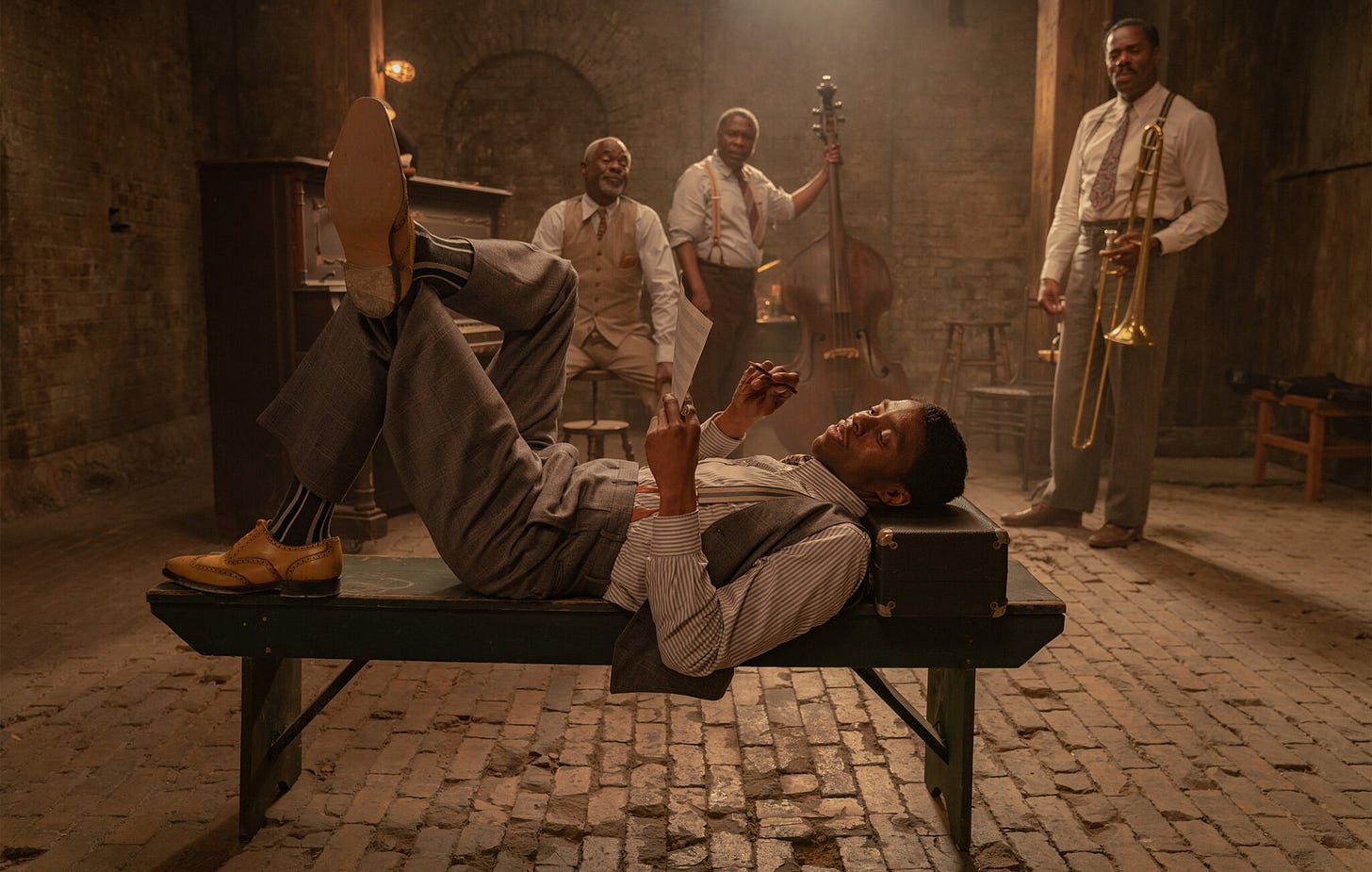Ma Rainey's Black Bottom

Ma Rainey was a formidable woman, and “Ma Rainey’s Black Bottom” is a juggernaut of equal force, a film that will most likely garner a lot of attention come awards season.
Ma (Viola Davis), a famed singer from the 1920s, struck fear into the hearts of white music producers at the height of Jim Crow, when most black people wouldn’t even dare talk back to a white person. But Ma knew her value, and threw her weight around both figuratively and literally, refusing to cave in to white people for demands as big as her song’s arrangement, or as small as having a Coca-Cola before she sings.
Her band is made up of four black men, all of whom admire Ma’s boldness but who have differing individual relationships with her. Cutler (Colman Domingo) is the trombone player and the de facto leader of the bunch, the band’s designated go-between with Ma; Levee (Chadwick Boseman in his final film performance) is the brash young troubadour with a smart mouth and designs on leading his own band; and Toledo (Glynn Turman) and Slow Drag (Michael Potts), on piano and bass, respectively, two veteran journeymen who are just there to do what they’re told and collect a check.
Power dynamics are at play from the beginning, as the band bickers over which version of Ma’s signature song “Black Bottom” they will play. Levee throws his weight around, though you get the feeling he doesn't realize just how little he has. He leverages his relationship with the white studio managers, using their desire to create uptempo tracks people can dance to his advantage. We learn he’s not only created a new version of “Black Bottom,” but at the request of Sturdyvant (Jonny Coyne), he’s written several other songs, which Levee claims will be the basis of his new band’s playlist.
And when Ma finally does arrive, all hell breaks loose, and Ma is driving the bus. Perpetually glistening with sweat, she rules her world with an iron fist, demanding her nephew (Dusan Brown) be allowed perform the spoken-word intro to her signature song, his stutter be damned, to telling anyone and everyone who disagrees or tells her no where to go, including her girlfriend (Taylour Page), whom Levee has his eye on.
The cast is strong top to bottom, though two things stand out most of all: Davis’s irrepressible performance as Ma, and Boseman’s Levee. Both are forces of nature in their own way, characters who aren’t created to be a certain type, but people whose life experiences and tragedies shape who they are.
Ma is larger than life, and Davis lays out playing her as such. She’s a proverbial bull in a china shop, unwilling to give an inch to anyone for anything. Even as she frustrates Sturdyvant, she has Irvin (Jeremy Shamos) wrapped around her finger, reducing him to a stammering yes-man at every turn.
Boseman gives the performance of his career, in one that has already been impressive. He’s noticeably thinner here than in previous roles, though honestly I’m unsure if that was a character choice or due to his battle with cancer. He’s boisterous to an almost psychotic degree, and a sequence where he takes offense to comments about his agreeable nature around white people is a powerful centerpiece to the film, one that cements his character’s motivations. He’s a pent-up ball of arrogant rage, and when he cuts loose it’s a thing of beauty.
The rest of the cast is also impressive, particularly Domingo and Turman. There’s an undercurrent of both joy and exhaustion to their characters as they navigate two immense personalities, whether they’re clashing or not.
“Ma Rainey’s Black Bottom” is a tremendous film, at this writing my favorite of 2020. It delivers laughs, shiver-inducing music, searing drama, and is a fitting, sad epitaph to the career of someone taken too soon. It's a powerful, touching cinematic snippet of black history, one of 2020's few must-see films.


